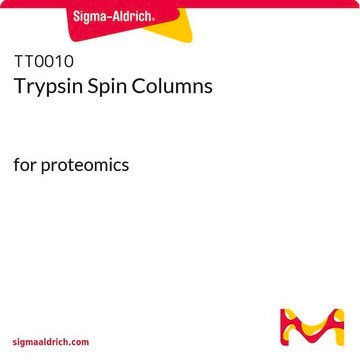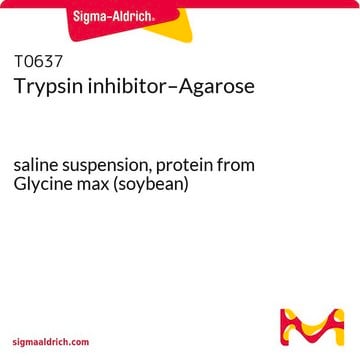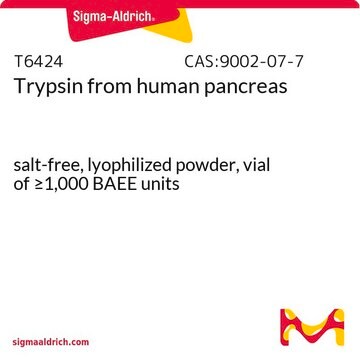T1763
Trypsin Agarose
buffered aqueous suspension, from bovine pancreas trypsin
Sign Into View Organizational & Contract Pricing
All Photos(1)
About This Item
MDL number:
UNSPSC Code:
12352204
eCl@ss:
42020142
NACRES:
NA.54
Recommended Products
biological source
bovine pancreas (trypsin)
form
buffered aqueous suspension
concentration
≥15 units/mL (packed gel)
extent of labeling
≥15 units per mL packed gel
matrix
cross-linked beaded agarose
shipped in
wet ice
storage temp.
2-8°C
General description
The trypsin molecule has two domains: one is related to the enzyme active site and the tryptophan residues; the other is related to the 8-anilinonaphthalene-1-sulfonate binding.
Trypsin Agarose is an insoluble enzyme product. It is produced by reacting a conventional "soluble" enzyme (trypsin) with an inert base (agarose). This insoluble conjugate retains the activity of the original enzyme. Trypsin bound to agarose are highly stable and maintain denaturing conditions for longer time than the soluble trypsin.
Application
A very active and very stable trypsin agarose derivative has been used to optimize the design of the synthesis of a model dipeptide, benzoylarginine leucinamide. Trypsin has also been used in a study to investigate protonation-state determination in proteins using high-resolution X-ray crystallography.
Trypsin Agarose has been used for enzymatic hydrolysis of prolamins and gliadin to generate peptides.
Other Notes
Insolubilized
Unit Definition
One unit will hydrolyze 1.0 μmole of BAEE per min at pH 8.0 at 30 °C (titrimetric assay).
Physical form
Suspension in approx. 10 mM acetic acid, pH 3.2
Signal Word
Warning
Hazard Statements
Precautionary Statements
Hazard Classifications
Eye Irrit. 2 - Skin Irrit. 2 - Skin Sens. 1 - STOT SE 3
Target Organs
Respiratory system
Storage Class Code
10 - Combustible liquids
WGK
WGK 3
Personal Protective Equipment
dust mask type N95 (US), Eyeshields, Gloves
Certificates of Analysis (COA)
Search for Certificates of Analysis (COA) by entering the products Lot/Batch Number. Lot and Batch Numbers can be found on a product’s label following the words ‘Lot’ or ‘Batch’.
Already Own This Product?
Find documentation for the products that you have recently purchased in the Document Library.
Customers Also Viewed
Amit Tripathi et al.
Proceedings of the National Academy of Sciences of the United States of America, 106(39), 16799-16804 (2009-10-07)
Increased intestinal permeability (IP) has emerged recently as a common underlying mechanism in the pathogenesis of allergic, inflammatory, and autoimmune diseases. The characterization of zonulin, the only physiological mediator known to regulate IP reversibly, has remained elusive. Through proteomic analysis
Jie Jiang et al.
Nature chemistry, 15(4), 578-586 (2023-02-23)
The discovery of crosstalk effects on the renin-angiotensin system (RAS) is limited by the lack of approaches to quantitatively monitor, in real time, multiple components with subtle differences and short half-lives. Here we report a nanopore framework to quantitatively determine
Raquel Olías et al.
Food research international (Ottawa, Ont.), 169, 112825-112825 (2023-05-31)
The presence of so-called anti-nutritional factors can reduce the bioavailability of nutrients following consumption of seeds which are otherwise an excellent source of proteins, carbohydrates and micronutrients. Among the proteins associated with negative effects on quality in pea (Pisum sativum
Victor F Zevallos et al.
The American journal of clinical nutrition, 96(2), 337-344 (2012-07-05)
Celiac disease is an enteropathy triggered by dietary gluten found in wheat, barley, and rye. The current treatment is a strict gluten-free diet. Quinoa is a highly nutritive plant from the Andes, with low concentrations of prolamins, that has been
S C Bracken et al.
Alimentary pharmacology & therapeutics, 23(9), 1307-1314 (2006-04-25)
In coeliac disease, wheat, barley and rye are traditionally excluded in the gluten-free diet. However, few studies have examined the small intestinal immune response to barley and rye. To investigate the immunogenicity of barley and rye prolamins (hordein and secalin
Our team of scientists has experience in all areas of research including Life Science, Material Science, Chemical Synthesis, Chromatography, Analytical and many others.
Contact Technical Service












